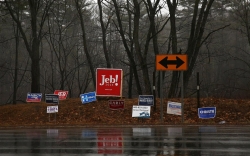












The stakes get higher in both races as the second round of nomination voting nears
In a triumph of two candidates who have seized on Americans' anger at the Washington establishment, in the New Hampshire primary on Tuesday, Bernie Sanders defeated Hillary Clinton, and Donald Trump scored his first victory.
Both outcomes would have been nearly unthinkable not long ago. Sanders, a self-described democratic socialist, defeated Clinton, a former secretary of state and first lady once seen as the all-but-certain Democratic nominee. While Clinton remains the favorite in the national race for her party's nomination, Sanders' win could be his springboard into a competitive primary campaign.
At stake Tuesday were fewer than 1 percent of the delegates who, at party national conventions in July, will choose nominees to succeed President Barack Obama. But a strong showing in New Hampshire can result in an increase in media coverage, donations and momentum into upcoming races, including those on Super Tuesday, March 1, when 11 states vote.
Sanders, at a raucous rally, said his victory sent a message "that will echo from Wall Street to Washington, from Maine to California. And that is that the government of our great country belongs to all of the people and not just a handful of wealthy campaign contributors and their super PACs."
He swept majorities of men, women, independents and young people to defeat Clinton but faces challenges in the more diverse states that come next on the primary calendar.
In her concession speech, Clinton echoed Sanders' calls for taking on Wall Street and tackling income inequality. But she cast herself as more prepared to make good on her pledges. "People have every right to be angry. But they're also hungry. They're hungry for solutions," she said.
As she trailed Sanders, 60 to 39 percent, based on 86 percent of the returns, she may also be angry. She barely won Iowa and now has been trounced in New Hampshire, where young voters liked his populist proposals to break up big banks and have the government pay for public college tuition.
For Trump, the brash real estate magnate and television personality who has never run for public office, the win was an important rebound after his loss to Texas Sen. Ted Cruz in last week's Iowa caucuses, the first nominating contest. Trump has led national polls for months, and the New Hampshire win reinforces his position as front-runner, proving his unorthodox, populist campaign can win primaries.
Word that he snagged first place in New Hampshire prompted supporters at Trump headquarters in Manchester to wave foam fingers declaring "You're hired."
Trump, appealing to voters seeking a political outsider, gained from the persistent lack of clarity among the more mainstream Republicans struggling to challenge him. "We are going to do something so good and so fast and so strong, and the world is going to respect us again, believe me," he said at a victory rally.
With his victory, attention shifted to the runners-up in the race. Several candidates needed a strong finish to ensure the survival of their campaigns. New Hampshire's verdict sets up a tough fight for Republicans in South Carolina on Feb. 20 and for Democrats there on Feb. 27.
Ohio Gov. John Kasich, who spent much of his time in New Hampshire in recent weeks, finished second on the GOP side. Throughout the heated primary campaign season, he has prided himself on not attacking his rivals. A moderate Republican from a politically important state, he told supporters Tuesday night that his second-place finish could be an indication that "we're turning the page on a dark part of American politics."
"We have a lot of people who have been promising money if we perform," said Tom Rath, a senior national adviser to Kasich. "Tonight, we performed."
Florida Sen. Marco Rubio, 44, had hoped to build on a solid third-place finish in Iowa and brush off a rocky performance in last weekend's Republican debate. Former Florida Gov. Jeb Bush and New Jersey Gov. Chris Christie spent most of their time in New Hampshire in recent weeks and needed to show voters as well as crucial financial donors that they're viable candidates.
The day was a blow for Rubio, who had appeared to be breaking away from the second-tier Republican pack. But he stumbled in Saturday's debate under intense pressure from Christie, who has relentlessly cast the young senator as too inexperienced and too reliant on memorized talking points to become president.
Rubio conceded that the debate may have hurt him in Tuesday's contest and pledged to supporters that his poor performance "will never happen again."
Christie, however, didn't benefit from roughing up Rubio. He was near the back of the pack as votes were being tallied and said he planned to return home to New Jersey to "make a decision on our next step forward." He canceled plans to go to South Carolina — a sign he could drop out soon.
Bush was pressing on, declaring that New Hampshire voters had "reset the race."
Wire services
Analysis: Former secretary of state walks line between record and reform in anti-establishment year
Analysis: The Republican front-runner is capitalizing on political forces that will outlast his candidacy
The self-described democratic socialist is set to challenge the Democratic front-runner Hillary Clinton from the left
Error
Sorry, your comment was not saved due to a technical problem. Please try again later or using a different browser.